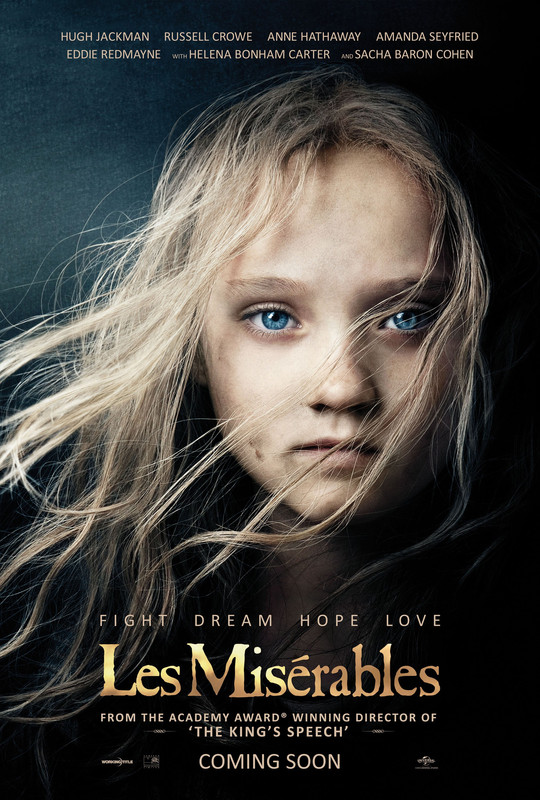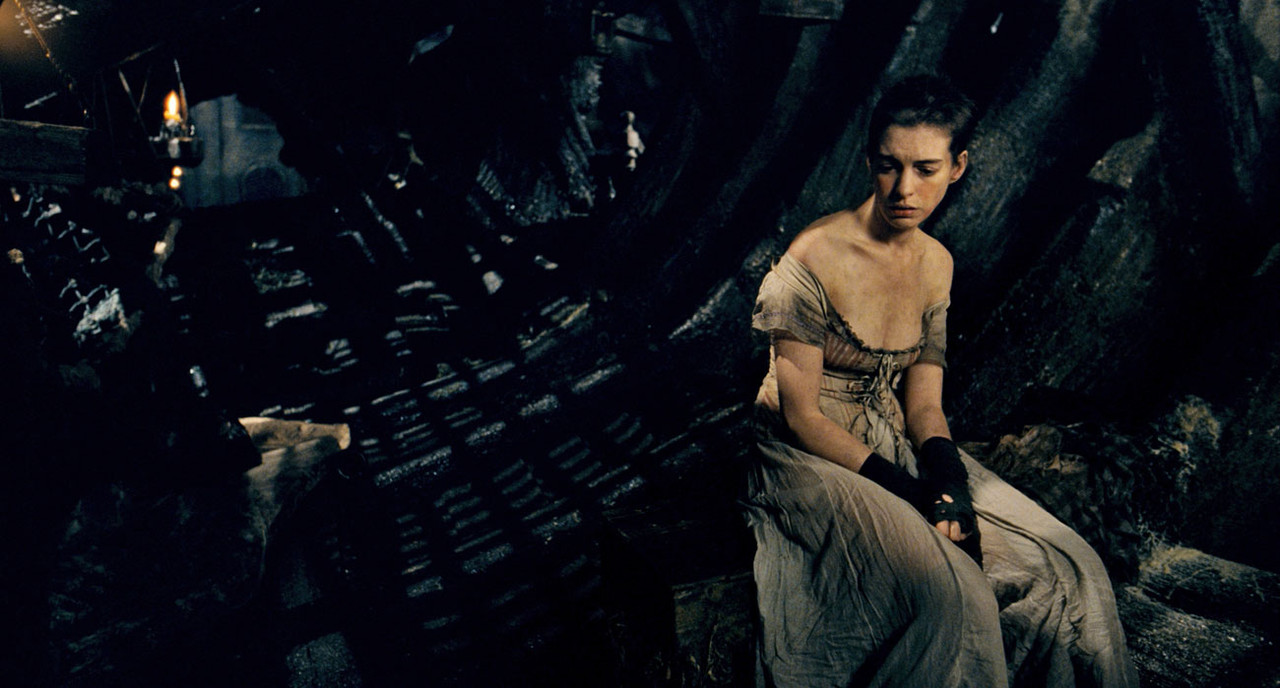Dir: Tom Hooper
I suspect, given the colossal and continuing success of the stage production, that a film version of the Les Misérables musical has been long in the planning. What eludes me is how the reins were eventually handed to British director Tom Hooper and who, based on work like inexplicably Oscar winning, barely elevated, ITV drama The King's Speech, thought that he'd be equipped to handle something of this scope.
The story was, I confess, new to me as I have neither read the book nor seen the musical (I did have to sing some of the songs in my theatre group, more than fifteen years ago now). Summarising the decades spanning tale is hard, but it essentially follows Jean Valjean (Hugh Jackman). We meet Valjean as a convict, serving hard time for stealing a loaf of bread. He escapes, and begins a new life, eventually rising to become a factory owner and mayor of a small town. All the time Valjean is still being pursued by Inspector Javert (Russell Crowe), whose custody he escaped all those years ago. In Valjean's factory the young Fantine (Anne Hathaway) is hounded out of her job, falling to become a prostitute. When Valjean hears of this he is grief stricken and agrees to find and raise Fantine's daughter Cosette (Isabelle Allen). Years later, France is again on the brink of revolution and the now grown Cosette (Amanda Seyfried) falls for one of the leaders of the youth movement, Marius (Eddie Redmayne).
Les Misérables is a difficult film to pin down as a critic, because some of its problems are hard to define. Take what I found to be one of the biggest issues; that the film never really manages to shake off its stage origins. I don't mean that in quite the usual way that people do when they call something 'stagy' (by which they usually mean a film that features characters sitting or standing and talking a lot in small sets). Les Misérables seems as though it should be more expansive than that; it spills out into the streets of Paris, and other parts of France besides, but still, it never feels cinematic, and that's largely down to the way that Tom Hooper has elected to shoot the film.
All but a few lines of dialogue are sung, and even those are generally spoken on key, in addition to which about three quarters of the film's running time is devoted to full songs, all of which Hooper shoots almost entirely in tight close up. This is a huge problem, because it means that well over half of the film is framed so tightly that Hooper completely excludes the world that he is attempting to build. In his efforts to heighten emotion he loses any sense of the expanse of the setting, and this means that the film feels claustrophobic and stagebound.
This stylistic choice comes close to hobbling the film all by itself, because of the many and various ways it affects the whole. Another huge issue is that it makes a huge portion of the film look incredibly samey. Every single song has at least a few shots of the singer leaning in so close to the lens that they almost seem to break the fourth wall. Inexplicably, Hooper even does this in chorus numbers, using masses of individual close ups rather than pulling back for the scale of a number. At times, it begins to feel not just as though the director has no other stylistic ideas, but that he simply doesn't know that he can change lenses or angles on his camera.
Perhaps even worse than the sheer tedium of Hooper's lensing of the songs is the way that by using this style where it doesn't fit, he robs it of power in the moments where it would otherwise have worked. I can see why he wanted to shoot the film's two big power ballads; 'I Dreamed a Dream' and 'On My Own' – both emotionally delivered by Anne Hathaway and Samantha Barks respectively – but having battered us into boredom with his shot selection, neither lands with the punch that it should.
Tom Hooper is his own worst enemy with this film - one of his completely pointless dutch angles (another favourite crutch) actually made me laugh out loud towards the end of the film - but he's far from the only problem. The cast is starry and reasonably high quality, but musically they are a mixed bag at best. Among the supporting cast Helena Bonham Carter recreates her grating cockernee singing from Sweeney Todd in a desperately unfunny double act with a mugging Sacha Baron-Cohen, but there are more pressing issues with the leads. As Javert, Russell Crowe is mostly awful. In his more conversational scenes with Hugh Jackman he sounds like an out of tune foghorn, while in his bigger songs he just sort of yells on key, like your Dad at a carol service. I'm not sure whether I was more put off by Crowe or Eddie Redmayne. Redmayne definitely has a better voice, but he's very much aware of it, and hams up every song (sadly he has many) to the nth degree. He also seems, even more than most of the cast are, to be playing to an imaginary audience, which only increases the film's peculiarly stagy feel. Hugh Jackman largely occupies a middle ground between these two, which should be fine, but much of the time I found his Valejean a little bloodless. For a character we live a quarter of a century with, he feels a little thin by the end, and I suspect that's more down to Jackman than it is the screenplay.
The women largely do better, though I regret to say I didn't find myself a fan of young Isabelle Allen, who plays Cosette as a child. Anne Hathaway is going to win this year's Best Supporting Actress Oscar, based on 'I Dreamed a Dream', and while it is one of the most impressive things in the film, it is just four minutes. This isn't to say that she's bad in the rest of the film, she's not, but it's not exactly revelatory work, and the rest of her performance is put in the shade by her featured song. Fantine, at least, gets a proper character arc during her fifteen or twenty minutes of screen time, the same can't really be said for her daughter Cosette. I'm not sure if any of the older Cosette's storyline from the stage has been cut for the film, but she feels woefully underdeveloped, and that leaves the romance plot of the second half floundering, despite a perfectly fine performance and pretty singing voice from Amanda Seyfried. Among the female cast the standout for me is perhaps Samantha Barks, making her film debut as Eponine, a role she has also played on stage. She makes her two featured songs two of the film's most moving moments, and I really hope this isn't the end of her screen career.
The one thing that Tom Hooper really does right with Les Misérables, and which almost makes the film worth seeing despite its many problems, is that he has all the actors sing live on set, rather than mime to pre-recorded tracks. This absolutely achieves the stated aim of having the songs be very much of the moment, and it immeasurably benefits the performances. This is best seen in 'I Dreamed a Dream' and 'On My Own', which prick at the emotions thanks to the rawness of the performances of Anne Hathaway and Samantha Barks respectively, and in 'Do You Hear the People Sing?' which is truly rousing.
Les Misérables is aggravating, there's the ghost of a great epic here; of something with scope, power and resonance, but it's lost in a miasma of abysmal directorial decisions by someone who seems totally unsuited to the job, which makes the moments and performances that do shine through all the more frustrating.
★★
★★



No comments:
Post a Comment